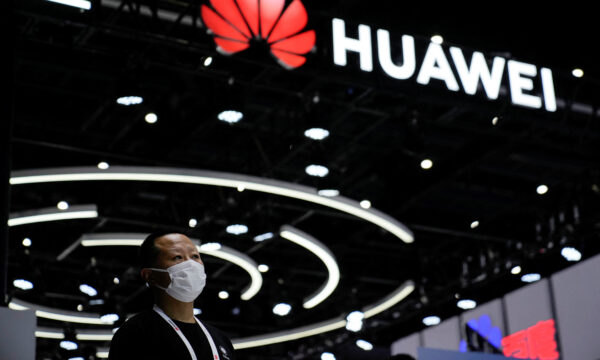Chinese Spying: A Huge Effort and a Huge Success
Commentary Chinese spy balloons are one small part of an enormous, “whole of society” decades-long espionage campaign that communist China has been conducting against the United States. And unfortunately, it has been successful. As with most intelligence operations, it’s a mix of technical and human platforms that aim to obtain (by any means) other countries’ secrets. However, China operates on a completely different scale. It’s not just the Ministry of State Security (MSS) deploying officers to recruit spies. China’s 2017 National Intelligence Law explicitly requires all Chinese companies and citizens to assist: “An organization or citizen shall support, assist in and cooperate in national intelligence work in accordance with the law and keep confidential the national intelligence work that it or he knows. The state shall protect the individual organization that has supported, assisted in, or cooperated in national intelligence work.” Even before 2017, an “invitation for tea” by the security services would have been plenty to know what was expected of one. It still is. Every Chinese company or citizen anywhere is a potential platform. Even people of Chinese extraction can be pressured to assist, especially if they have family, business interests, or anything else that ties them back to China. This is very different than the United States, where, for example, Apple refused even to help American authorities unlock a terrorist’s phone. Conversely, the Chinese use satellites, electronic eavesdropping, and cyber operations, as well as their companies and hardware, to get into U.S. telecommunications and electrical networks. To name just a few: Huawei, ZTE, Lenovo, Hikvision, and China Telecom. And U.S. companies helped them get set up and embedded into American systems. Why? The Chinese make sure their products are cheap, and the American companies just can’t resist. And this isn’t just “sucking up information.” Some of it can be used offensively. Don’t be surprised when the power goes off and public utilities in the United States don’t function. A person stands by a sign of Huawei during the World Artificial Intelligence Conference in Shanghai on Sep. 1, 2022. (Aly Song/Reuters) China’s spies also capitalize on all the freedoms the United States has to offer, including freedom of movement, freedom to call yourself a journalist (even if you are an MSS operative), and freedom to buy strategically located real estate to serve as collection platforms. FBI Director Christopher Wray said the FBI opens a counterintelligence case involving China every 12 hours. But for every case they open, they are probably missing 100. China goes after military and state secrets, as well as commercial secrets and intellectual property—anything that’s potentially useful. It’s been doing this for years. The idea is to “leap over stages” and advance China’s economic development. And, in that, the Chinese regime doesn’t have a monopoly on spying. Individual Chinese will steal technology and know-how with the aim of setting up their own companies. And an American company that sets up in China is making things easy for Chinese spies—both from the government and “freelancers.” Even Elon Musk is going to learn the hard way. It might not necessarily be state-directed, but it might be useful to the regime later and adds to Chinese economic advantage and national power. How resilient is the United States against Chinese spying? There has probably never been a great power that did less to protect itself from an avowed enemy’s espionage efforts. And even the United States might someday find itself at a fatal disadvantage. A screenshot of the FBI wanted poster for Chinese military members involved in the Equifax hacking. (FBI/Screenshot via The Epoch Times) How bad is it? There have always been Americans in government and outside who recognized the Chinese espionage threat. Nick Eftimiades, formerly with the DIA and CIA, wrote the book on Chinese spying in the early 1990s and has spread the gospel ever since. But there are too few of him, and he and the others haven’t been listened to as they should. Indeed, as the Americans examine the Chinese balloon, much of the technology in the “collection” part of the system will no doubt look familiar—since China got it from us. The FBI regularly indicts and sometimes punishes Chinese spies (if they’ve actually got them in custody) and their associates—including Americans. But this is a pinprick. Also, the penalties aren’t much. The Chinese national who helped MSS steal the C-17 transport plane plans was convicted and imprisoned for only four years. And, by and large, the United States has overlooked (usually intentionally) Chinese spying. One data point of many: The private security firm Strider reported in 2022 that, from 1987 to 2021, at least 162 Chinese scientists who had worked at Los Alamos—the U.S. research lab where the atomic bomb was developed—returned to China to contr

Commentary
Chinese spy balloons are one small part of an enormous, “whole of society” decades-long espionage campaign that communist China has been conducting against the United States. And unfortunately, it has been successful.
As with most intelligence operations, it’s a mix of technical and human platforms that aim to obtain (by any means) other countries’ secrets. However, China operates on a completely different scale.
It’s not just the Ministry of State Security (MSS) deploying officers to recruit spies.
China’s 2017 National Intelligence Law explicitly requires all Chinese companies and citizens to assist: “An organization or citizen shall support, assist in and cooperate in national intelligence work in accordance with the law and keep confidential the national intelligence work that it or he knows. The state shall protect the individual organization that has supported, assisted in, or cooperated in national intelligence work.”
Even before 2017, an “invitation for tea” by the security services would have been plenty to know what was expected of one. It still is. Every Chinese company or citizen anywhere is a potential platform. Even people of Chinese extraction can be pressured to assist, especially if they have family, business interests, or anything else that ties them back to China.
This is very different than the United States, where, for example, Apple refused even to help American authorities unlock a terrorist’s phone.
Conversely, the Chinese use satellites, electronic eavesdropping, and cyber operations, as well as their companies and hardware, to get into U.S. telecommunications and electrical networks. To name just a few: Huawei, ZTE, Lenovo, Hikvision, and China Telecom. And U.S. companies helped them get set up and embedded into American systems. Why? The Chinese make sure their products are cheap, and the American companies just can’t resist.
And this isn’t just “sucking up information.” Some of it can be used offensively. Don’t be surprised when the power goes off and public utilities in the United States don’t function.

China’s spies also capitalize on all the freedoms the United States has to offer, including freedom of movement, freedom to call yourself a journalist (even if you are an MSS operative), and freedom to buy strategically located real estate to serve as collection platforms.
FBI Director Christopher Wray said the FBI opens a counterintelligence case involving China every 12 hours. But for every case they open, they are probably missing 100.
China goes after military and state secrets, as well as commercial secrets and intellectual property—anything that’s potentially useful.
It’s been doing this for years. The idea is to “leap over stages” and advance China’s economic development. And, in that, the Chinese regime doesn’t have a monopoly on spying.
Individual Chinese will steal technology and know-how with the aim of setting up their own companies. And an American company that sets up in China is making things easy for Chinese spies—both from the government and “freelancers.” Even Elon Musk is going to learn the hard way.
It might not necessarily be state-directed, but it might be useful to the regime later and adds to Chinese economic advantage and national power.
How resilient is the United States against Chinese spying?
There has probably never been a great power that did less to protect itself from an avowed enemy’s espionage efforts. And even the United States might someday find itself at a fatal disadvantage.

How bad is it?
There have always been Americans in government and outside who recognized the Chinese espionage threat. Nick Eftimiades, formerly with the DIA and CIA, wrote the book on Chinese spying in the early 1990s and has spread the gospel ever since. But there are too few of him, and he and the others haven’t been listened to as they should.
Indeed, as the Americans examine the Chinese balloon, much of the technology in the “collection” part of the system will no doubt look familiar—since China got it from us.
The FBI regularly indicts and sometimes punishes Chinese spies (if they’ve actually got them in custody) and their associates—including Americans. But this is a pinprick. Also, the penalties aren’t much. The Chinese national who helped MSS steal the C-17 transport plane plans was convicted and imprisoned for only four years.
And, by and large, the United States has overlooked (usually intentionally) Chinese spying.
One data point of many: The private security firm Strider reported in 2022 that, from 1987 to 2021, at least 162 Chinese scientists who had worked at Los Alamos—the U.S. research lab where the atomic bomb was developed—returned to China to contribute to its research and development programs. Besides nuclear weapons designs, these “alumni” have helped China advance key military and dual-use technologies.

Yes, Chinese nationals working at the most sensitive U.S. facilities. What could go wrong?
How does the United States defend itself?
It doesn’t, really. The FBI makes a modest effort, private sector companies go through the motions of protecting their technology, academia is firmly opposed to cracking down on Chinese spying at U.S. universities and research centers, and Wall Street resists anything that angers China. As late as 2009, the commander of the U.S. Indo-Pacific Command offered to help China develop aircraft carriers. And many senior officers still want to engage with the People’s Liberation Army.
American administrations have mostly ignored the problem. When Chinese hackers stole 23 million Office of Personal Management files in 2015, the Obama administration refused to say the word “China.” Reward or ignore bad behavior, and you’ll get more of it.
There have been some efforts at self-defense, but they often aren’t sustained. The Trump administration closed China’s Houston consulate—a hotbed of spying—and forced the DOJ to launch the China Initiative against Chinese spies at U.S. universities. This put the fear of God in Beijing. Then, shortly after taking office, the Biden administration shut down the China Initiative—American academics claimed it was racist.
The U.S. government did revoke China Telecom’s license in 2021—although it was two decades late.
Doesn’t the United States spy as well?
The United States does spy, but it’s the traditional methods, such as electronic and satellite surveillance and a relatively tiny number of intelligence officers trying to recruit Chinese spies—who might produce and hopefully not be compromised by an American Quisling or dodgy covert communications devices. The United States does not do “commercial” espionage.
Ultimately, if a U.S. congressman with alleged ties to a Chinese spy can serve on the House Intelligence Oversight Committee, the Americans are not serious.
I’m reminded of a comment by a young Marine officer in Afghanistan some time back: “Sir, I think we want to lose.”
Views expressed in this article are the opinions of the author and do not necessarily reflect the views of The Epoch Times.












